- Home
- Lisa Kleypas
Devil in Disguise Page 5
Devil in Disguise Read online
Page 5
“And after that?”
“Sales meetings the rest of the week, with businesses who are after buying whisky for independent bottling.”
“They would put their own labels on it?”
MacRae nodded, looking rueful. “It’s no’ something I’d prefer,” he admitted, “but it’s profitable, and there are many improvements needing to be made to the distillery.”
They stopped at the bottom of the stairwell, and Merritt turned to look up into his shadowed face.
Time for good-bye, she thought, and the forlorn feeling came over her again.
“It sounds as if your days are occupied,” she said, trying to sound casual, “but what about the evenings? Have you made plans? I could give a small, informal dinner at my house, and introduce you to some lovely people. I promise you would enjoy yourself—”
“No,” MacRae said hastily. “Thank you, but I’ll have been keeping company with new folk all day.”
“I understand.” Merritt hesitated. “Perhaps it should be just the two of us. I have an excellent cook. She’ll make something simple. Not tomorrow night, of course—you’ll want to rest. But the next night, you must come to my house for dinner. We’ll have a quiet, relaxing evening.”
MacRae stayed unnervingly silent. He stared at her steadily, his eyes a flicker of starlight in the shadows.
He was going to refuse. How could she persuade him?
“You did say we would have a whisky someday,” she reminded him. “This will be the perfect opportunity.”
“Merritt—”
“Which reminds me—I wanted to ask about the name stamped on your whisky casks. The very long one that starts with P.”
“Priobairneach.”
“Yes, what does it mean?”
After a moment, MacRae said, “In English it means something like ‘sudden excitement.’”
She smiled at that. “Will you bring some for me to try?”
But there was no answering smile. “Merritt,” he said quietly, “you know why I cannot come.”
As she pondered how to reply, she thought of a conversation she’d once had with her father, the most sensible man who’d ever existed. They’d been talking about various problems she’d faced after taking the reins at Sterling Enterprises, and she’d asked how he knew whether a risk was worth taking.
Her father had said, “Before taking a risk, begin by asking yourself what’s important to you.”
Time, Merritt thought. Life is full of wasted time.
She hadn’t realized it until now, but her awareness of squandered time had been growing during the past year, eroding her usual patience. So many rules had been invented to keep people apart and wall off every natural instinct. She was tired of them. She had started to resent all the invisible barriers between herself and what she wanted.
It occurred to her this must be how her mother often felt. As a strong-willed young heiress, Mama had come to England with her younger sister, Aunt Daisy, when no gentlemen in New York had been willing to offer for either of them. Wallflowers, both of them, chafing at the limitations of polite behavior. Even now, Mama spoke and acted a little too freely at times, but Papa seemed to enjoy it.
“Mr. MacRae,” Merritt said, “for the past three years, I’ve managed a shipping firm, attended hundreds of business meetings, and filled out paperwork for days on end. Other than my younger brother, my closest companion has been the company accountant. This evening, I met with a government excise supervisor for nearly two hours. As you might guess, none of this was the stuff of my childhood dreams. I’m not complaining, only pointing out that far too much of life is filled with responsibilities we haven’t necessarily asked for. Which is why I feel perfectly justified in having dinner with a friend.”
“Friend,” MacRae repeated, now looking sardonic. “Is that what I am?”
“Yes, why not?”
He moved closer to her in the stairwell, his shadow falling over her. The glow of a gas lamp silhouetted his head.
“You would no’ call me that,” he said softly, “if you understood the temptation you are to me.”
There it was—the truth laid out before them.
Merritt decided to ignore it.
“Temptation can be resisted,” she said reasonably. “One makes a decision and sticks to it. I’m sure I’ll be able to rely on your honor, as well as my own. Let’s enjoy each other’s company—discreetly, of course—without complications. Dinner will be at eight o’clock. My house is not far from here, number 3 Carnation Lane. Red brick, with white trim, and ivy on the—”
She broke off as her helpful directions were extinguished by the sweet, hot shock of his mouth on hers.
It was not the kiss a friend would give. It was heat and demand, fused in a raw sensuality that demolished her balance. Her gloved hands slid up to grip his broad shoulders. The kiss went on and on, exploring deliciously, wringing sensation from her mouth. One of his hands wandered over her back, stroking her spine into a pleasured arch. Her breasts felt full and tender, and she longed for him to touch them . . . kiss them . . . oh, God, she’d lost her mind.
She felt how hard he was all around her, every muscle taut. His breath rode roughshod on every powerful rise and fall of his chest. Reaching down, he gripped her hips to pull them high against an unmistakably rigid, swollen shape. She thought of how it would feel to lie spread beneath him, with all that hardness inside her, and a faint moan slipped from her throat.
MacRae licked at the sound as if he could taste it, and broke the kiss to rest his forehead against hers. Their panting breaths mingled.
It was hard to speak with him still clasping her hips against his. Every part of her was throbbing. “I suppose you think that proved a point,” she managed to say.
“Aye,” he said gruffly. “Dinna tempt me to prove it again.” But he ducked his head to steal another kiss . . . and another . . . nuzzling and biting gently at her lips as if he couldn’t help himself. He let out a shaken sigh and held her tightly, and said something in Gaelic that sounded like a curse.
Slowly, almost painfully, he eased their bodies apart and went to brace his hands against the wall of the stairwell. Lowering his head, he took several long, deliberate breaths.
Realizing he was willing his arousal to subside—and not finding it easy—Merritt felt a responsive quiver deep in her belly.
Eventually he pushed away from the wall and reached for the door, and held it open for her.
The cold night air drew a tremor from her as MacRae escorted her out to the carriage.
Upon seeing their approach, the footman hastened to open the carriage door and pull down the folding step.
Before entering the vehicle, Merritt paused to say one last thing to MacRae. She was pleased by how casual and ordinary she was able to sound, with all her thoughts in chaos. “I’ll expect you at my house the day after tomorrow.”
His eyes narrowed. “I dinna say I would come, you wee bully.”
“Don’t forget the whisky,” she said, and hastily entered the carriage before he could reply.
Chapter 5
After a small fortune in whisky had been stamped and delivered safely into the bonded warehouse, it had taken every last spark of Keir’s remaining energy to climb the stairs to his flat. He’d slept all through the afternoon and night, and had awakened feeling refreshed and ready to take on the world.
The day’s meetings had required the purchase of a new coat, since the one he’d brought needed to be laundered and was so old it probably wouldn’t survive the washing. First, he’d gone to the penny pie shop, where he’d eaten his fill of pies for breakfast and asked where he might find some ready-made clothing.
For the first time in his life, Keir bought a garment stitched by machine. The black wool peacoat, styled after the ones worn by sailors and longshoremen, was double-breasted and cut short enough to allow the legs freedom of movement. It fit well enough, although the sleeves were too short and the middle too loose. He proceede
d to a public house for a meeting with the manager, who intended to place a large order after his lawyer reviewed the details of the independent bottling contract.
His next meeting was on the west side, in the St. James area. At the suggestion of one of Islay’s well-to-do residents, an elderly lawyer named Gordan Catach, Keir had decided to approach a prominent gentlemen’s club with the intention of selling a special lot of forty-year-old single malt.
“The most famous clubs are White’s, Brooks’s, and Boodle’s,” Catach had told him. “Any of those would have the means to pay a steep asking price. But if I were you, lad, I’d first try Jenner’s. It doesnae have so high a pedigree as the others, but ’tis the one everyone wants to belong to. Some gentlemen—higher-ups, mind ye—spend as long as ten years on the waiting list.”
“How’s that?”
“Jenner’s offers the most luxury, the finest food and liquor . . . there’s even a smoking room where they’ll hand-roll a fresh cigar to suit your taste. The club was started lang ago by a professional boxer. His daughter married the Duke of Kingston, who owns the place now.”
Keir, who couldn’t have cared less about some doddering old aristocrat, responded with an indifferent shrug. “’Tis no’ unusual for a duke to own prime London real estate.”
“Aye, but the interesting part is, Kingston ran the club himself for a time.” To make sure Keir understood the significance, Catach added, “Noblemen never work. To their minds it lowers them, ye ken, and costs them the respect of common folk as well as their peers.”
“He must have had no choice,” Keir mused.
“To be sure. But the duke made Jenner’s what it is, and enriched himself in the process.” Catach had shaken his head with a mixture of admiration and envy. “A charmed life, that one’s had. They say in his youth, Kingston was as wicked as the devil himself. The bane of every man with a pretty wife. Then he married a rich woman and settled into a respectable middle age. For Kingston, the wages of sin have been nothing but gold and treasure.”
“He sounds like a selfish pult,” Keir said flatly. “I’ll no’ be selling my whisky to such a man.”
“Dinna be a dunderclunk, lad. You won’t be meeting with the duke himself. He gave over the running of it to someone else lang ago. Now, you’ll want to write to the club steward. He’ll have the charge of placing orders with tradesmen and superintending the cellar.”
At Catach’s urging, Keir had struck up a correspondence with Horace Hoagland, the managing steward of Jenner’s, and they’d agreed to meet when Keir came to London.
Keir did his best to appear relaxed as he entered Jenner’s with a small wooden case containing whisky samples. He might appear a primitive lout to these people, but he was damned if he’d act like one. Still, it was difficult not to stand and stare slack-jawed at his surroundings. Jenner’s was more opulent than any place Keir had ever set foot in, with acres of white marble, plasterwork covered in gold leaf, rich soundless carpeting, and a canopy of crystal chandeliers overhead. The club was centered around a cavernous central hall with a grand staircase and marble balcony railings extending along the upper floors.
Thankfully there were no snouty aristocratic patrons in sight, only servants busy cleaning and polishing things that already looked clean and polished.
“Mr. MacRae.” A stocky middle-aged man, dressed to the nines in a fine dark suit of clothes with shiny buttons, approached him immediately. “Horace Hoagland, the club steward,” he said, extending his hand. “A pleasure to finally meet you.”
The steward’s friendly demeanor put Keir at ease, and they exchanged a firm handshake.
“Welcome to Jenner’s,” Hoagland said. “What do you think of the place?”
“’Tis very grand.”
The steward smiled. “I count myself the luckiest chap in the world, being able to work here.” He led the way to a series of rooms with box-paneled ceilings and leather Chesterfield couches, and deep chairs arranged around small tables. Freshly ironed newspapers and sparkling crystal cigar dishes had been set out on the tables. “I have a special fondness for Islay single malt,” Hoagland remarked. “Years ago, a Scottish cousin made a gift to me of a bottle from the MacRae distillery.” He sighed reminiscently. “Smooth as cream, with a finish like a charred apple orchard. Extraordinary.”
“My father loved what he did.”
“He taught you his methods?”
“Since I was knee high,” Keir assured him. “I started by carrying bags of malt to the kiln, and went on to learn every job in the distillery.”
They sat at a table, where a round tray of clean drinking glasses had been set out. Keir unlatched the wooden sample box he’d brought, revealing a row of miniature bottles, each containing a dram of whisky.
“This is the batch you wrote to me about?” Hoagland asked, staring at the samples with frank anticipation.
“Aye. After my father’s passing, my men and I took inventory at the distillery and found a hidden cellar where he’d stashed a hogshead of single malt. It had been sitting there untouched for forty years.” Keir uncorked one of the miniature bottles and poured the amber liquid into a glass. “We finished it in first-fill sherry quarter casks for a year, bottled it, and named it Ulaidh Lachlan—Lachlan’s Treasure—in honor of my father.”
“How many bottles in total?”
“Two hundred ninety-nine,” Keir replied.
Hoagland swirled the whisky in the glass, moved it close to his nose, and inhaled deeply. He took a taste, paying attention to the soft, rolling feel of it in his mouth. The subtle variations of his expression revealed the progression of flavors . . . the opening of dry, dusty wood and salt brine, like lifting the lid of a pirate’s treasure chest . . . the richness of bread pudding . . . finishing with a surprising meringue lightness and a touch of smoke.
The club steward was silent for a moment, staring at the remaining contents of the glass. “Isn’t that something,” he murmured. “A rare handsome whisky. I don’t believe I’ve ever tasted its equal.” He tasted it again, savoring it. “How round the malt is.”
“We bottled it at cask strength.”
Hoagland took another sip, closing his eyes to better appreciate it, and released a long sigh. “How much for the lot?” he asked.
“All of it?”
“All two hundred ninety-nine bottles.”
“Three thousand pounds,” Keir said readily.
Hoagland looked resigned rather than surprised. It was a fortune—at least ten times what ordinary whisky would cost. But they both knew this was no ordinary whisky. They both knew, also, that Keir could easily find another buyer.
“For that sum,” Hoagland said, “I’ll expect you to throw in the rest of those samples.”
Keir grinned and nudged the wooden box toward him.
Hoagland parted his lips to say something, but paused and looked over Keir’s shoulder, his face brightening. “You’re in luck, MacRae,” he said. “The Duke of Kingston himself just entered the club rooms. It’s possible you’ll have the honor of meeting His Grace, if he comes this way.”
Having never seen a duke before, Keir resisted a strong temptation to twist in his chair and take a look. “I was told Kingston didn’t have the running of the club anymore,” he remarked.
“No, indeed. But the duke still considers Jenner’s the jewel in the crown of his empire, and he never goes long without stopping by.” Still gazing at Kingston, Hoagland glowed as if in the presence of some celestial being. “His Grace is speaking with the head waiter. No other gentleman of his status would take such notice of an inferior. But the duke is a most gracious man.”
Keir was vaguely annoyed by the man’s reverence, which seemed a hairsbreadth away from fawning.
“Ah—yes—he’s walking over here,” the steward exclaimed, and pushed his chair back to stand.
Keir wondered if he should stand as well. Was that something only servants did, or were commoners obliged to rise to their feet? No—he wouldn
’t stand to meet the duke like a boy answering a question from the village schoolmaster. But then he thought of how his father had always cautioned, “The proudest nettle grows on a dung heap.”
Reluctantly he began to ask the steward, “Should I—”
“Yes,” Hoagland said with quiet urgency, his gaze riveted on the approaching duke.
Keir pushed back his chair and stood to face Kingston.
From what he’d been told about the duke’s past, Keir would have expected a florid old dandy, or a rheumy-eyed satyr. Anything but this elegantly lean man who moved with the supple ease of a tomcat. His clean-shaven face was a marvel of bone structure: a gift of male beauty that could never be outlived. The dark gold of his hair was silvered at the temples and sides, and time had weathered his complexion here and there with fine lines. But the signs of maturity only made him seem more powerful. The sheer presence of the man caused the hairs on Keir’s arms to prickle in warning beneath the too-short sleeves of his ready-made coat.
“Hoagland,” Kingston said in a voice like expensive liquor on ice, “it’s good to see you. Your son is better, I trust?”
“You’re very kind to ask, Your Grace. Yes, he’s recovered fully from his tumble. The poor lad’s grown so fast, he hasn’t yet learned to manage those long arms and legs. A rackabones, my wife calls him.”
“My boy Ivo is the same. He’s shot up like a weed of late.”
“Will he grow as tall as your other two sons, do you expect?”
“By force of will, if necessary,” the duke replied dryly. “Ivo has informed me he has no intention of being the youngest and the shortest.”
Hoagland chuckled and proceeded to make introductions. “Your Grace, this man, Mr. Keir MacRae, has brought whisky samples from his distillery in Islay. Will you try a dram? I recommend it highly.”
“No, it’s a bit early for—” The duke broke off as his gaze moved to Keir.
Keir found himself staring into blue eyes, as light and piercing as winter frost. The man’s stillness reminded him of a golden eagle sighting prey on the island.

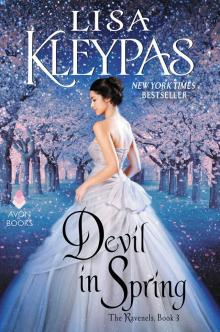 Devil in Spring
Devil in Spring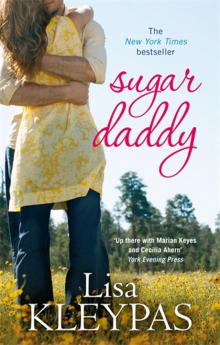 Sugar Daddy
Sugar Daddy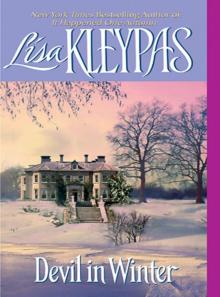 Devil in Winter
Devil in Winter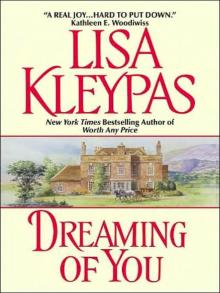 Dreaming of You
Dreaming of You Christmas Eve at Friday Harbor
Christmas Eve at Friday Harbor Love, Come to Me
Love, Come to Me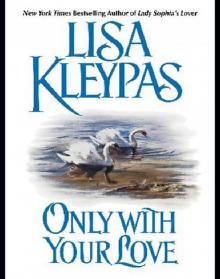 Only With Your Love
Only With Your Love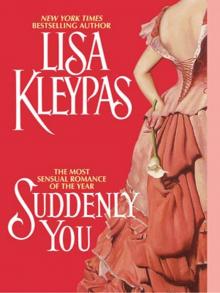 Suddenly You
Suddenly You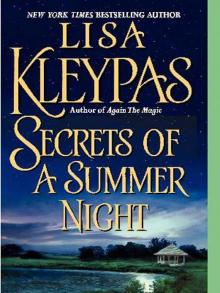 Secrets of a Summer Night
Secrets of a Summer Night Cold-Hearted Rake
Cold-Hearted Rake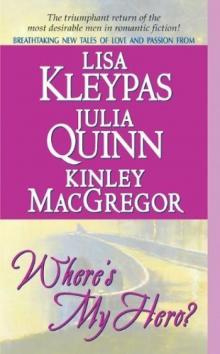 Where's My Hero?
Where's My Hero?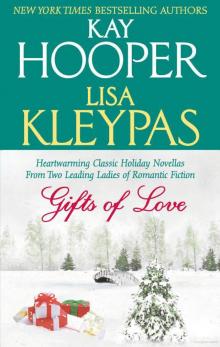 Gifts of Love
Gifts of Love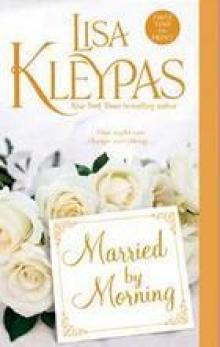 Married by Morning
Married by Morning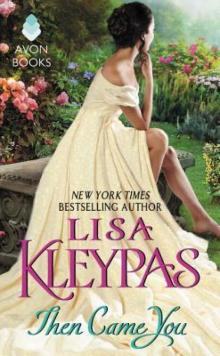 Then Came You
Then Came You Wish List
Wish List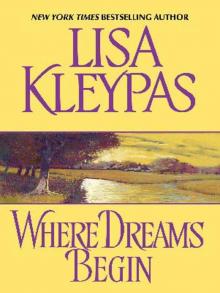 Where Dreams Begin
Where Dreams Begin A Historical Christmas Present
A Historical Christmas Present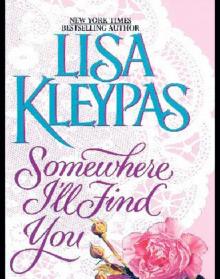 Somewhere I'll Find You
Somewhere I'll Find You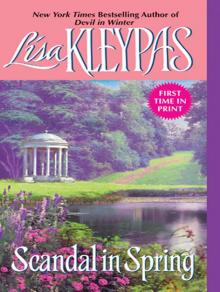 Scandal in Spring
Scandal in Spring Someone to Watch Over Me
Someone to Watch Over Me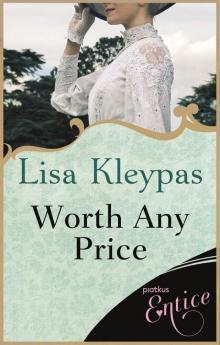 Worth Any Price
Worth Any Price Prince of Dreams
Prince of Dreams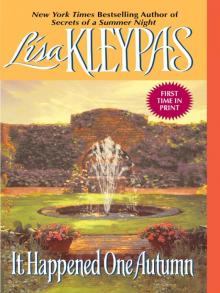 It Happened One Autumn
It Happened One Autumn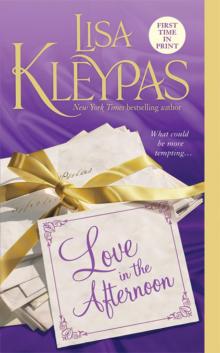 Love in the Afternoon
Love in the Afternoon Devil's Daughter
Devil's Daughter A Wallflower Christmas
A Wallflower Christmas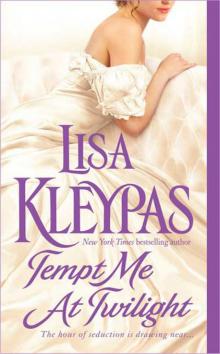 Tempt Me at Twilight
Tempt Me at Twilight Brown-Eyed Girl
Brown-Eyed Girl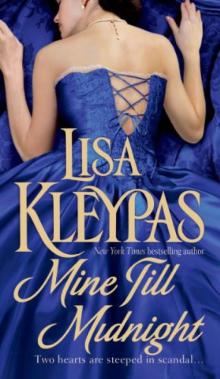 Mine Till Midnight
Mine Till Midnight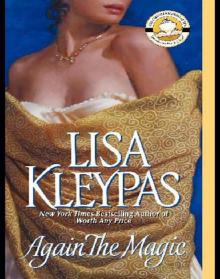 Again the Magic
Again the Magic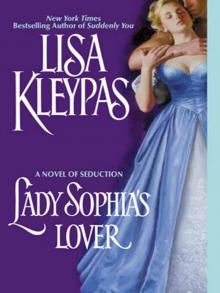 Lady Sophia's Lover
Lady Sophia's Lover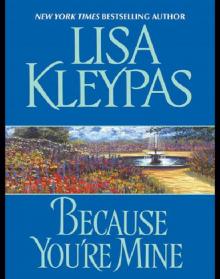 Because You're Mine
Because You're Mine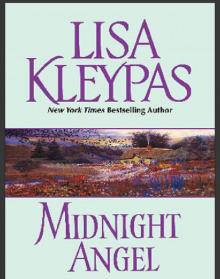 Midnight Angel
Midnight Angel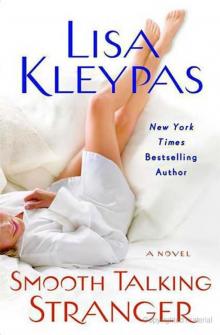 Smooth-Talking Stranger
Smooth-Talking Stranger Blue-Eyed Devil
Blue-Eyed Devil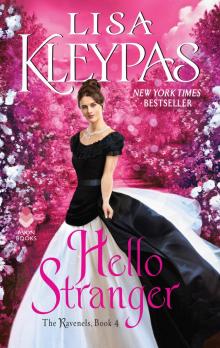 Hello Stranger
Hello Stranger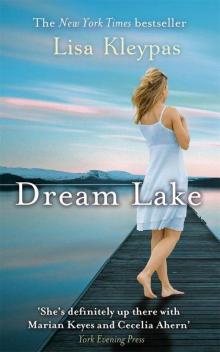 Dream Lake
Dream Lake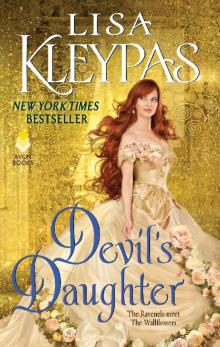 Devil's Daughter: The Ravenels Meet the Wallflowers
Devil's Daughter: The Ravenels Meet the Wallflowers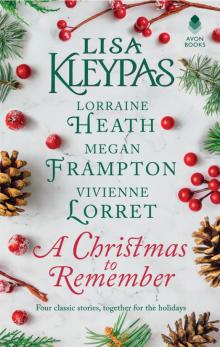 A Christmas to Remember
A Christmas to Remember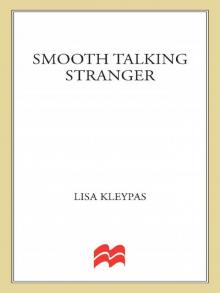 Smooth Talking Stranger
Smooth Talking Stranger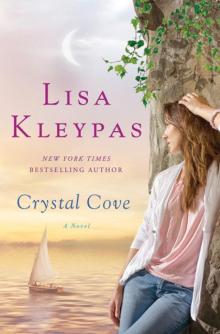 Crystal Cove
Crystal Cove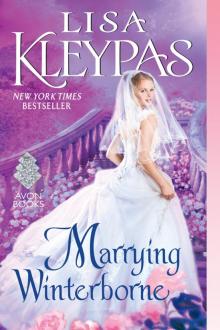 Marrying Winterborne
Marrying Winterborne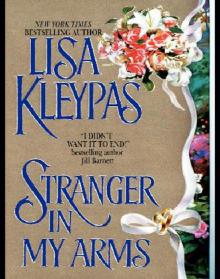 Stranger in My Arms
Stranger in My Arms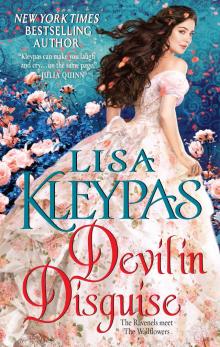 Devil in Disguise
Devil in Disguise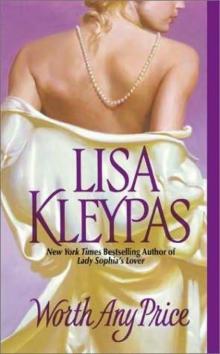 Worth Any Price bsr-3
Worth Any Price bsr-3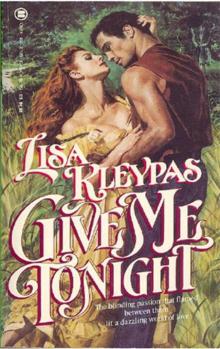 Give Me Tonight
Give Me Tonight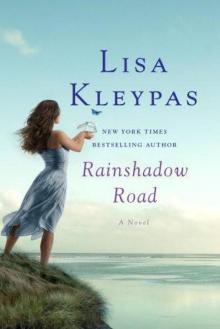 Rainshadow Road fh-2
Rainshadow Road fh-2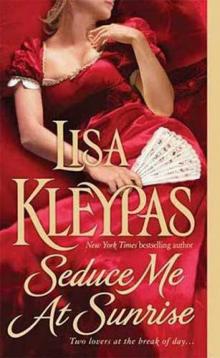 Seduce Me At Sunrise
Seduce Me At Sunrise I Will
I Will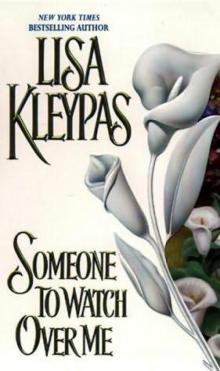 Someone to Watch Over Me bsr-1
Someone to Watch Over Me bsr-1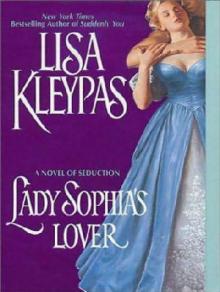 Lady Sophias Lover bsr-2
Lady Sophias Lover bsr-2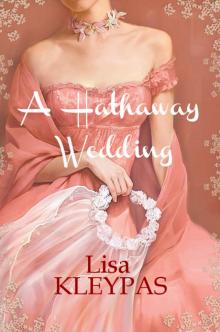 A Hathaway Wedding
A Hathaway Wedding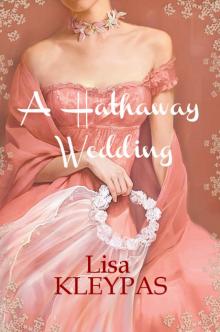 A Hathaway Wedding (Hathaways Bk2.5)
A Hathaway Wedding (Hathaways Bk2.5)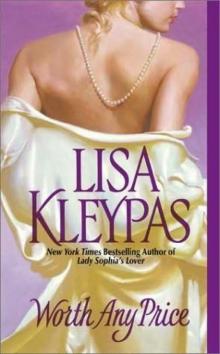 Worth Any Price - Bow Street 3
Worth Any Price - Bow Street 3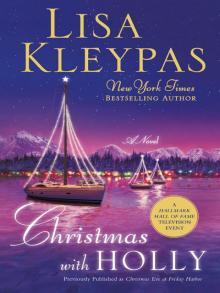 Christmas with Holly
Christmas with Holly